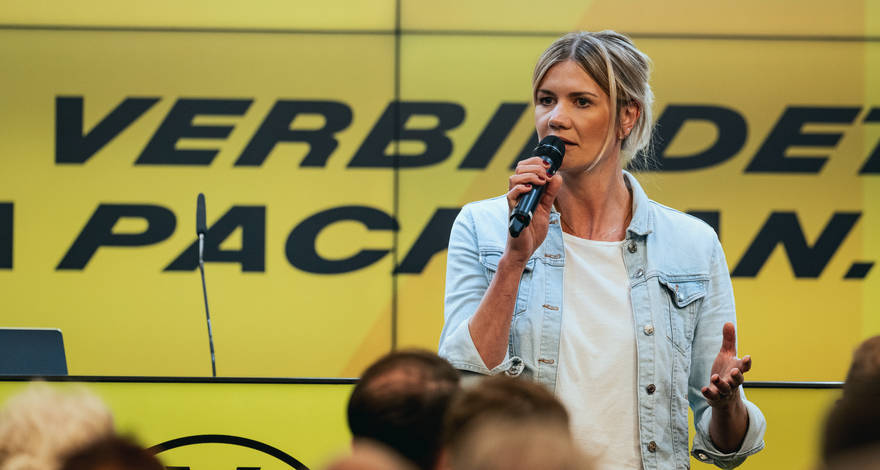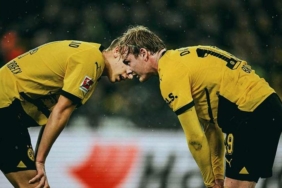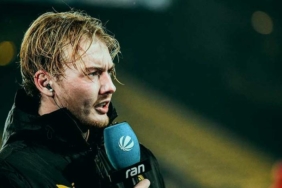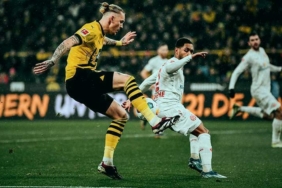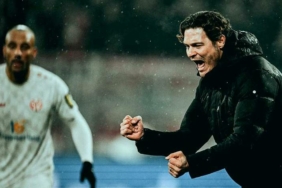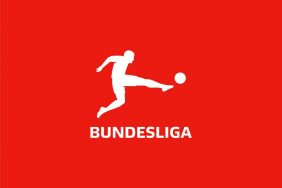“It is up to society as a whole to overcome ecological and social challenges. The expectations on club football to assume more and more responsibility are also rising steadily.” That is according to the latest Borussia Dortmund sustainability report. Hans-Joachim Watzke summed up BVB’s commitment years ago very clearly when he said: “We only have one planet that we can play football on.”
A football team has eleven players on the pitch. And there are now seven people in the now 913-strong workforce of Borussia Dortmund who are exclusively tasked with tackling the topics of social, economic and ecological sustainability. “Football,” said Watzke, “has a fundamental responsibility, because it is one of the few remaining institutions that unites society.”
“Sustainability has become part of our business strategy,” affirmed Marieke Köhler, head of the Corporate Responsibility department at Borussia Dortmund. She stressed: “We are committed to our social responsibility. We use our resources very responsibly, because otherwise we will no longer be viable in the future. If we don’t work on it, we will lose the basis for our existence in the first place.” She explained: “The concept of sustainability covers much more than just the topic of ecology.” It is about corporate governance, internal social issues, and the classic commitment to society in general that Borussia Dortmund first pooled together under the banner of the “leuchte auf!” foundation, which was established back in 2012. “Because these issues, and there are many of them, have nothing to do with our business model or governance structures.”
As early as 2016, Borussia Dortmund began to define ecological responsibility, with managing director Carsten Cramer declaring it was “no coincidence that we have had a photovoltaic system on our stadium roof since 2012, and no coincidence that we have been using 100% green electricity for six years.” The football Bundesliga is the first professional sports league to have made a clear commitment to sustainability its top priority. A two-step process has been one of the licensing criteria since the start of the current season. “All clubs recognise that football has a social responsibility,” said Watzke. And the chairman of the board added: “This first step was important, and the first criteria are now part of the licensing process. We want to become the most sustainable league in Europe.

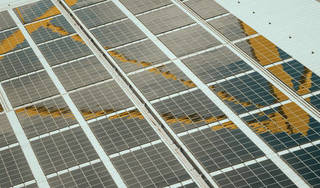
“BVB now employs seven full-time employees in its Corporate Responsibility department. The external pressure for more sustainability, which is now putting pressure on companies, is also prompting clubs to engage in this area. “The external regulatory system is currently changing very dynamically and drastically, meaning that we have to consistently create structures that are viable in the long-term,” said Köhler. He insisted simply stopping at goodwill actions “according to the motto of doing something here, something there” was not enough. “We need to demonstrate where we have established structures in the areas of human rights, social responsibility and the environment.” That leads to further questions: How do you deal with your suppliers? What are the supply chains like?
The topics are complex, many intertwine, and are not just fixed on the above-mentioned pillars of social, economic and environmental sustainability. Look at merchandising, for example: when it comes to the production of merchandise, human rights, environmental protection and resources are highly important issues. The club is fortunate to have more than one expert in its own ranks: top of that list, however, would be Ingo Klein, who spent his entire professional life in textiles, including many years working on BVB merchandising, and is now working in the CR department. His task is to guarantee the sustainability of products and supply chains. “In the context of sustainability, many things are very closely related,” said Marieke Köhler.
What is sustainability? Where is it most visible? Where are the main areas of tension?
“Why do we really need football?” asked Marieke Köhler, looking to provoke a response. Football burns energy, produces waste, it causes emissions, especially from transport and mobility. “You want to play in international competitions, so you have to fly, and you want your fans to come with you. That is part of our core business and we cannot deviate from it. Mobility accounts for 50 percent of our downstream emissions.” But this affects the entire event industry – and if you like, also the entire leisure and tourism industry. So what should we do – all lock ourselves in at home?! Nobody wants that either. It is a matter of using resources in a more responsible and above all more considerate manner!
“We are the only football club that offers all fans a free public transport ticket to travel to our home games from anywhere in the state,” said Carsten Cramer. The aim is to get as many fans as possible to switch from private transport onto the railways. Approximately 30 percent – around 25,000 spectators – currently use public transport on each match day, and that number is rising. A further ten percent come on foot or by bicycle. “But we will never be able to come up with a solution that means everyone can come to us by train, by bike or on foot,” Köhler knows. Although there are considerations relating to improvements of the bicycle infrastructure together with the city of Dortmund, the focus is currently primarily on individual traffic. If there are going to be cars, then there should be as few as possible. Together with the fan affairs department, work is underway to create a ride-share portal. There is still potential room for improvement here, even if an analysis by the club’s sustainability partner DSW21 revealed that a surprisingly high number of vehicles in the car parks are occupied by up to four fans. This also shows that the issue of sustainability has found its way into the hearts of the supporters. Going to the game together will help save the environment and your money.
Borussia Dortmund are also continuing to address the theme of mobility when it comes to our own workforce. The charging infrastructure for electric vehicles in the underground car park has been expanded. “There are still a few things that we can tweak,” said Cramer. A subsidised Germany-wide ticket could follow the subsidised job ticket “in order to create a further incentive not to come by car,” says Köhler. If this were also to lead to a shift in transport when it comes to the employees in their free time, then all the better.

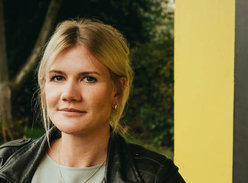
There is certainly the most room for improvement in the area of the energy consumption of the buildings. When building the sports facility in Dortmund-Brackel, we took all of the most modern developments into account, including a photovoltaic system and a cistern that stores rainwater that is used to irrigate the training ground’s pitches. The office on the Rheinlanddamm, however, is already 20 years old, and the stadium will turn 50 next year. When it was built, a litre of fuel oil cost twelve Pfennig – roughly the equivalent of six cents. The building’s architects could not have envisaged that today it would be 200 times higher when coming up with the plans. Energy insulation was an entirely alien concept at the time.
SIGNAL IDUNA PARK consumes as much electricity per year as 2,500 households, and as much heat as 400 households. You might think the floodlights would be the biggest energy eaters, but in reality, that is not the case at all, partly because they were converted to LED lights two years ago. The biggest consumer overall is the vast number of small consumers, which can quickly add up. Improvements can be made here, for example, by replacing refrigerators and, potentially, by using the waste heat they produce to heat the premises. It’s hard to believe, but the heated area in the stadium covers some 22,000 square metres. The thermostat has already been turned down. “A certain drop in comfort is absolutely acceptable,” said Carsten Cramer, who constantly asks himself the question: “How can we make things even more efficient?”
Reducing consumption is the most ambitious task. “That’s where the heart of the matter lies,” Köhler knows. But there is only a small window of time available for renovation work every summer, and these measures involve extremely high investments.
One interesting approach could lie beneath the stadium, and would lead from the under-soil heating – which accounts for one-eighth of the heat requirement – deep down into the earth, where coal was mined in the 19th century. The ambitious goal is to generate long-term benefits from the long-term burdens created by mining. The mine water is to be used to generate energy by means of heat exchangers. It has a temperature of anywhere between 13 degrees Celsius and up to 35 degrees Celsius in the northern part of the Ruhr area, where the mines went particularly low. Under SIGNAL IDUNA PARK, experts expect it to be 14 to 16 degrees. This year, a pilot hole is to be drilled to provide information on whether this type of renewable energy can be used for under-soil heating and also for the hot water in the toilets. The previous way of firing up the water in the gas condensing boiler to over 65 degrees”, says Köhler, “when in the end, you only need 45 degrees for hot water or to heat the pitch,” is undoubtedly antiquated. There is also a small side effect to implementing the planned changes – they will make us a little bit more independent of energy imports.
The solar panel system on the roof of the stadium is another potential area for improvement. It will turn eleven years old this year and will therefore soon have reached the end of its service life. Plans are already being drawn up for a new, much more efficient system. We are also considering installing battery banks in order to be able to cap the consumption peaks. The dream is to have a game under the floodlights in front of 81,000 fans – and all the energy required for it is generated in-house.
“Sustainability,” said Cramer, “is an absolute question of conviction for our club. It was a responsibility the club took on when it was founded in 1909, because the club’s founding fathers made it clear that we are more than a football club, that we can make a difference and act as a role model.”
“We want to become the most sustainable league in Europe.”
Paper napkins instead of paper plates for bratwurst, for example, and swapping plastic forks for wooden ones. These small changes can add up. What packaging is better for the environment? In the year after EURO 2024, we are looking to buy compactors to compress all the waste. So while there won’t be less waste, it won’t have to be picked up as often, saving trips for the bin men, and therefore energy and emissions. To do this, however, the conditions must first be created so that the ground underneath the compactors is stable enough. A biogas plant would be another consideration, as would the renaturation of a brownfield site in the region together with a partner, simply as a service to society.
Not all of the ideas can always be implemented, and sometimes even the most obvious ones are not so easy. Look at reusable cups, for example. They are available in SIGNAL IDUNA PARK, but not everywhere. Disposable cups are still used in the south stand and in the away sections because they could be misused and thrown as projectiles. The motto is indeed that “beer has to flow and not fly”, but the fans’ cooperation is required here in order to implement a potential switch to entirely reusable cups throughout the whole stadium. But it must also be said, while 100 percent of the disposable cups flow back into the raw material cycle, the reusable cups have to be cleaned externally, which requires extra trips to and from the stadium (see above). The infrastructure of the 50-year-old stadium means it cannot be done in-house. Other clubs are much better positioned in that regard.
In turn, bureaucracy is a stumbling block in the re-use and recycling of food. “You aren’t able to distribute second-hand food and drink,” explained Köhler. BVB are taking a different approach here, inviting people in need to the stadium for a warm meal at least once a month. This is not so much a measure to prevent food waste as it is a social commitment. Reducing waste is therefore a different kettle of fish, and it comes down to “calculating well and shopping well”.
Talk about steps taken in the field of economics might not be as eagerly received as ecological issues, but in general, Marieke Köhler says: “The legislation is getting tougher, due diligence tasks must be completed, especially in the field of supply chains, where the key phrase is ‘human rights’.” Diversity, equality and the gender pay gap are also on the agenda.
“We are taking a leading role here.”
The “leuchte auf!” foundation has been running for eleven years. Borussia Dortmund nailed its colours to the mast early on when it comes to social responsibility. The “independent foundation with legal capacity does a lot when it comes to our social commitment by spreading what is important to us as Borussia Dortmund, especially in the local area,” emphasised Marieke Köhler. She lists a number of examples, which we have already discussed in detail and on several occasions in the BORUSSIA members’ magazine for those particularly interested: “We have to manage to put the topic of education in an ecological context, and have opened the BVB learning garden and initiated a bee project on the Borsigplatz.” Borussia Dortmund not only want to educate people about sustainability, but also give children and young people in socially disadvantaged areas the opportunity to participate in educational projects. Fighting against racism and anti-Semitism is particularly important to everyone in Black and Yellow. The educational trips to former concentration camps under the Nazi regime one of a number of potential examples. “We are strengthening organisations that deal with issues like these. We are taking a leading role here.”
And let’s not forget the primary school projects that the football academy runs with love and passion outside its core business, or the “Nordstadtliga”, which is an educational and sports programme in one. For people looking to lose a bit of weight, there is the “football fans in training” programme.
And why are we doing all of this? “Because we have to be careful not to lose our reason for existence in the first place,” Hans-Joachim Watzke warned, with a call to action for not only our own people, but the entire league: “We have to do better!” Carsten Cramer’s question, meanwhile, is rhetorical: “What institution connects people and can influence people as much as football? So we have to do more than just football, we have to lead the way. As BVB, we in particular are able to call people to action – always with transparency, credible communication and by raising awareness of the topic, without preaching.” There is a special department to help in this regard. Head of department Marieke Köhler and her team are working hard: “We want to use Borussia Dortmund’s profile to contribute to the success of society as a whole. We can help people shed their fears and do something they aren’t yet familiar with.”
Together, we can achieve a lot. Even small steps are still steps in the right direction.
You can read the 2023 Sustainability Report here.
Author: Boris Rupert
Photos: Hendrik Deckers, Alexandre Simoes
This article comes from the BORUSSIA members’ magazine. BVB members can receive BORUSSIA free of charge every month. Click here to register to become a member.

